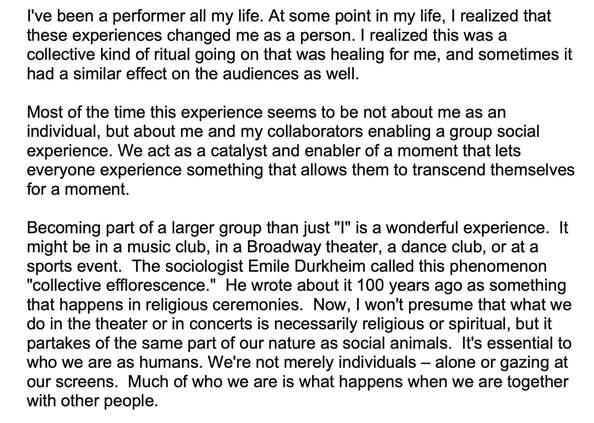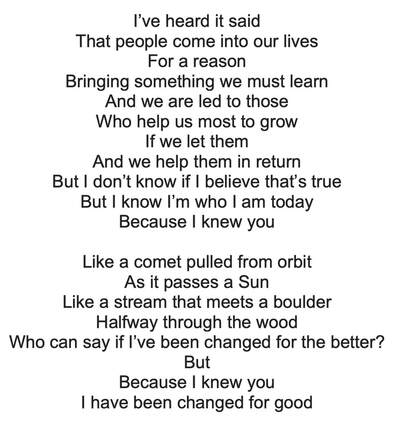In any case, while watching the September 26th episode, they did several stories about the reopening of the Broadway theatres and the “special” that CBS was going to show that evening which would include some of the Tony awards for the 2019-2020 theatre season. Part of that coverage was an opinion piece by the musician David Byrne which mentioned the ideas of Emile Durkheim relating to “collective efflorescence.” Byrne put it this way.
You don’t have to explore the history of at least European theatre very far to discover that what we call theatre was invented as a part of an ancient Greek religious festival and was a part of the worship of the (lesser) God, Dionysus. We scholars probably haven’t emphasized it enough, but it seems pretty obvious that those old Greeks intended it to be at least a “spiritual” (or dare I say “religious”?) experience.
But I would suggest that it is perfectly possible to have a “religious” experience in the privacy of one’s own room without the intercession of priest, minister or even any other person. What I believe regarding the experience which Durkheim called “collective efflorescence” is that he is describing the experiencing of a relationship between and among those gathered in a specific place, at a specific time for a specific purpose; and that purpose involves the sharing of a common experience. Certainly, that shared experience can involve religious ideas, but that certainly does not appear to be required. I would go so far as to suggest that theatre (and other “live” performances) can (and should) be shared experiences of exactly this nature.
Let me explain, if theatre (and other performed arts) is/are merely entertainment, then I feel obliged to inquire “Why do people still want to attend performances?” Let’s be honest. Attending a performance is a real pain. You have to go to the performance place at a certain time (not necessarily of your own choosing), spend a fair amount of money, fight traffic and other people, and put up with the many annoyances of all of these. Buying a cd of a musical performance, or a DVD or video of a play, musical, or concert is SO much more convenient. The only possible reason why we still go to “live” performances has to have something to do with the difference between the “live“ performance experience and a recorded one.
I would suggest that that difference relates to Durkheim’s ideas, but may be easier to understand if we consider Nietzsche’s discussion of Apollonian and Dionysian. In Greek mythology, Apollo and Dionysus are both sons of Zeus. Apollo is the god of the sun, of rational thinking and order, and he appeals to logic, prudence and purity. Dionysus is the god of wine and dance, of irrationality and chaos, and appeals to emotions and instincts. Nietzsche discusses both of these concepts in relation to religion. Apollo is the rational, logical, ordered side of religion, the side which deals with morality, justice, etc. The Dionysian aspect of religion is the wild, ecstatic, chaotic frenzy which relates to the emotional side of the “religious” experience. To simplify my point, I would ask, “Why don’t we have the same response to recordings that we get from the “live” performance?” I have many recorded performances and have enjoyed them a great deal. Still, I have NOT had the same kind of experience as a listener/viewer of a recorded performance that I have had during a “live” one. I would suggest that it is because the recorded performance may appeal to the Apollonian side of us, but the live one has greater appeal to the Dionysian.
Let’s be honest, live performances are fraught with perils. Anyone who has ever been a part of one (as performer [I include technicians] or audience) will (if he/she is honest) tell you that there has probably never been a “perfect” performance, and there probably never will be. I think that’s why we appreciate recorded performances. They allow the artist(s) to distribute a performance which has been refined to the point of being “as good as we can make it” and it will be identical every time it’s played. Why is that it is never quite as exciting, moving, even emotionally satisfying as the “live” experience of the same material by the same performers? I would argue that it’s simply because IT’S NOT THE SAME AS A “LIVE” PERFORMANCE! AND THAT’S THE POINT!
So, what could possibly make this inevitably less perfect performance better? I would suggest that it’s the collective efflorescence which Durkheim was writing about a hundred years ago. It’s the sense that “I was there, I was a part of this event, I may not be able to describe exactly what happened, but something did, and it affected me!”
Not long ago, I wrote a post which discussed something about how The Fantasticks has impacted my life. I was first exposed to it when one of my college roommates drove me crazy playing the original Off-Broadway Cast Album repeatedly after he had seen the show. I even got to the point where I didn’t care for it, and I only went to see it, when I was in NYC with some friends, because they wanted to see it. I was sick of those songs.
Obviously, something happened which changed my mind. I think I know what it was. I’m completely convinced that what happened was that I was changed by my experience sitting in the tiny Sullivan Street Playhouse in Greenwich Village that April evening in 1963 or ‛64. I can’t explain it, but something happened to me that night which not only changed my mind about that show, but, I think, changed me as a person.
This is what live theatre (and other live performances from symphonic to “pop” and folk concerts, to ballets, to operas and, certainly, musicals have given me time after time from at least that day to the present. Even when the performance may not have met what I would consider to be the highest standards of quality, there has almost always been some sort of communal experience which was exciting to be a part of.
I have had a similar sort of experience on other occasions, during ceremonies ranging from commencements to patriotic occasions, and including religious gatherings, as well. In all cases, I would suggest that the experience is, at least similar. I would suggest that the commonality of such experiences is due to the fact that we have structured all of these sorts of events to have features in common, which are intended to create the same sort of shared experience. This is not to suggest that any of these experiences is better, or worse, than another. No, I would suggest that they are, in many ways, the same thing.
Perhaps this lyric from Wicked sums it up better than I could:
I’d like to think that maybe I have helped change a few others, as well. Hopefully, for the better.
LLAP,
Dr. B


 RSS Feed
RSS Feed